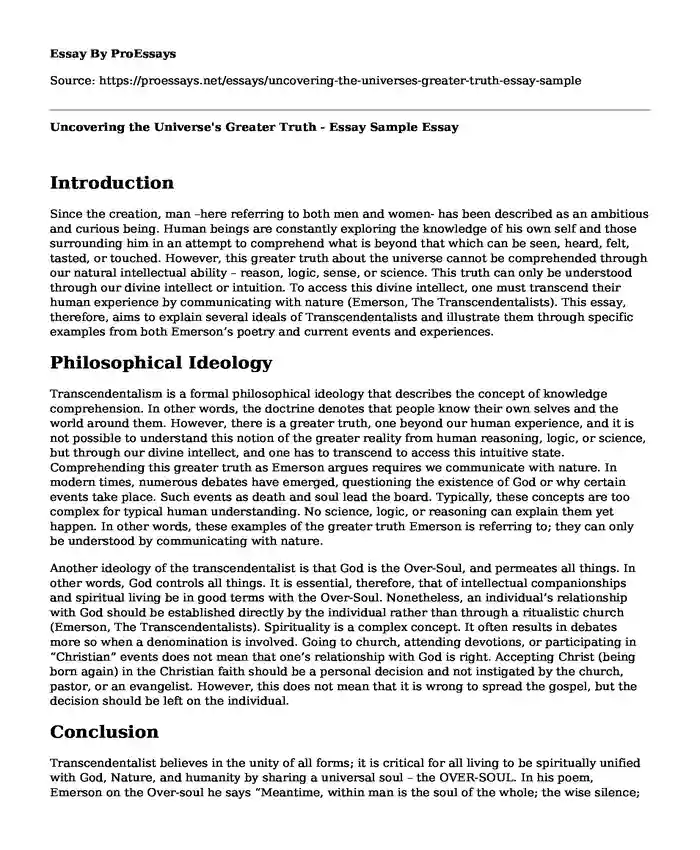Introduction
Since the creation, man –here referring to both men and women- has been described as an ambitious and curious being. Human beings are constantly exploring the knowledge of his own self and those surrounding him in an attempt to comprehend what is beyond that which can be seen, heard, felt, tasted, or touched. However, this greater truth about the universe cannot be comprehended through our natural intellectual ability – reason, logic, sense, or science. This truth can only be understood through our divine intellect or intuition. To access this divine intellect, one must transcend their human experience by communicating with nature (Emerson, The Transcendentalists). This essay, therefore, aims to explain several ideals of Transcendentalists and illustrate them through specific examples from both Emerson’s poetry and current events and experiences.
Philosophical Ideology
Transcendentalism is a formal philosophical ideology that describes the concept of knowledge comprehension. In other words, the doctrine denotes that people know their own selves and the world around them. However, there is a greater truth, one beyond our human experience, and it is not possible to understand this notion of the greater reality from human reasoning, logic, or science, but through our divine intellect, and one has to transcend to access this intuitive state. Comprehending this greater truth as Emerson argues requires we communicate with nature. In modern times, numerous debates have emerged, questioning the existence of God or why certain events take place. Such events as death and soul lead the board. Typically, these concepts are too complex for typical human understanding. No science, logic, or reasoning can explain them yet happen. In other words, these examples of the greater truth Emerson is referring to; they can only be understood by communicating with nature.
Another ideology of the transcendentalist is that God is the Over-Soul, and permeates all things. In other words, God controls all things. It is essential, therefore, that of intellectual companionships and spiritual living be in good terms with the Over-Soul. Nonetheless, an individual’s relationship with God should be established directly by the individual rather than through a ritualistic church (Emerson, The Transcendentalists). Spirituality is a complex concept. It often results in debates more so when a denomination is involved. Going to church, attending devotions, or participating in “Christian” events does not mean that one’s relationship with God is right. Accepting Christ (being born again) in the Christian faith should be a personal decision and not instigated by the church, pastor, or an evangelist. However, this does not mean that it is wrong to spread the gospel, but the decision should be left on the individual.
Conclusion
Transcendentalist believes in the unity of all forms; it is critical for all living to be spiritually unified with God, Nature, and humanity by sharing a universal soul – the OVER-SOUL. In his poem, Emerson on the Over-soul he says “Meantime, within man is the soul of the whole; the wise silence; the universal beauty, to which every part and particle is equally related, the eternal ONE” (line 2 &3) (Emerson, Emerson on the Over-soul). Transcendentalism emphasizes on wholesome well-being. Today, this concept is achieved through acts of meditation and relaxation exercise where an individual focuses on both spiritual and mental health. Balancing between emotions, demands, and needs can be challenging, sometimes resulting in stress and anxiety, by having control of one’s thoughts, spiritual wellness, and optimum connection with nature, humanity, and God, they are more likely to be happy, healthy, and productive.
Works Cited
Emerson, Ralph Waldo. “Emerson on the Over-soul.” Baym, Nina. The Norton Anthology of American Literature, Vol. B 1820-1865. Eighth Edition. W. W. Norton & Company, 2011.
Emerson, Ralph Waldo. “The Transcendentalists.” n.d.
Cite this page
Uncovering the Universe's Greater Truth - Essay Sample. (2023, Nov 16). Retrieved from https://proessays.net/essays/uncovering-the-universes-greater-truth-essay-sample
If you are the original author of this essay and no longer wish to have it published on the ProEssays website, please click below to request its removal:
- Critical Essay on Theme of Pride in Persepolis by Marjane Satrapi and the Kite Runner by Khaled Hosseini
- The Role of Satan in the Inferno - Paper Example
- The Role of Women in Frankenstein Society Essay
- Essay Example on Cassio & Bianca: An Apology, Assurance, and Jealousy
- Essay Example on Buddhism: A Religion of Unity, Not Difference
- Revenge in Shakespeare's Hamlet: A Study of Themes - Essay Sample
- Essay Sample on Ethical Principles: Defining Right and Wrong







